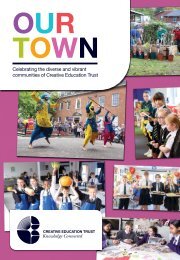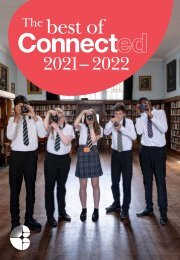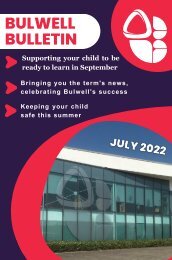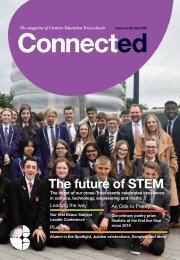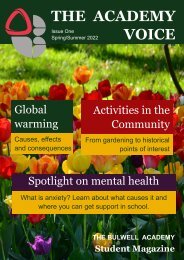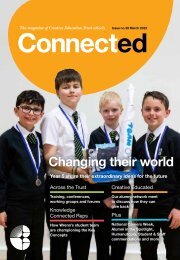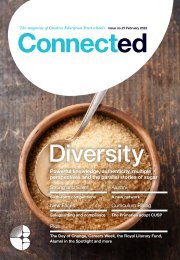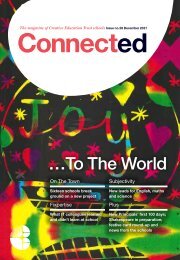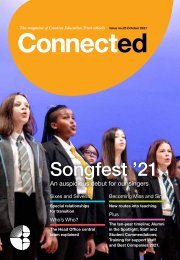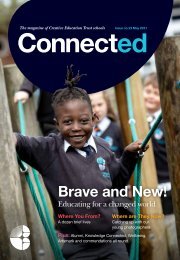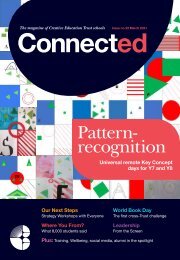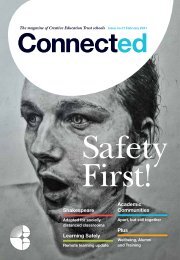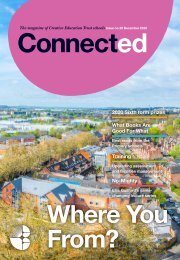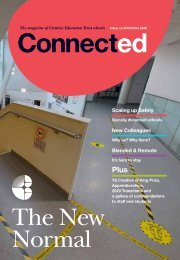Connected issue 24
The 24th issue of Connected: the magazine of Creative Education Trust schools
The 24th issue of Connected: the magazine of Creative Education Trust schools
You also want an ePaper? Increase the reach of your titles
YUMPU automatically turns print PDFs into web optimized ePapers that Google loves.
02<br />
<strong>Connected</strong><br />
The magazine of Creative Education Trust schools<br />
Issue no.23<br />
May 2021<br />
Action!Research<br />
SHOWCASE<br />
2021<br />
Nimish Lad, Curriculum Research Lead in the Education team, introduces<br />
a new academic venture for the Creative Education Trust network<br />
Earlier this year, we embarked on an ambitious,<br />
Trust-wide project, to improve the impact of<br />
teaching on pupil outcomes by using research.<br />
Under the broad headings of Effective Pedagogy,<br />
Coaching Strategies and Tackling Disadvantage,<br />
more than 20 staff applied research-informed<br />
strategies that they had read about in books,<br />
journals and blogs to their practice. Each of<br />
these groups has been supported by me,<br />
Isaac Howarth (Headteacher of Queen Eleanor),<br />
Dawn Ashbolt (Vice Principal at Wrenn) and<br />
David Howell (Assistant Principal at Wrenn).<br />
Five key ‘Action Research Projects’ took the<br />
spotlight at the Creative Education Trust’s first<br />
research showcase event on July 1st, which was<br />
attended by colleagues from across the network,<br />
including Principals and senior leaders, teachers,<br />
executives, and Board members.<br />
These projects demonstrate the<br />
breadth of research that staff<br />
have engaged with, and the<br />
practical nature of the projects<br />
which have had a direct impact<br />
on pupil outcomes.<br />
Jessica Delf Teacher of English, Caister<br />
Raising attainment and engagement<br />
of disadvantaged boys in English<br />
My aim was to ensure that the disadvantaged boys in my class – and by<br />
extension all students – got engaged, achieved, and ‘loved’ English. I wanted<br />
to unpick the myths that surrounded boys’ learning. I was also very aware<br />
that my Y10 class had missed a chunk of Y9 because of the pandemic,<br />
and therefore, had missed out on vital skills necessary for the transition to<br />
KS4. I wanted to reignite their spark and enjoyment surrounding English.<br />
I started by looking at research around the curriculum and investigating<br />
strategies I could use in the classroom to catch my students up in an<br />
impactful way, and get them to access English in a way they enjoyed.<br />
Among other books, my understanding was supported by:<br />
Symbiosis Kat Howard and Claire Hill (2020)<br />
Unleashing Great Teaching<br />
David Weston and Bridget Clay (2018)<br />
Several Short Sentences about Writing Verlyn Klinkenborg (2012)<br />
Boys Don’t Try Matt Pinkett and Mark Roberts (2019)<br />
Next I started looking at the engagement of boys, specifically, and worked<br />
out how to apply what I had learned from the books to boys in the<br />
classroom. Pinkett and Roberts’s Boys Don’t Try really helped here.<br />
From my general reading, it had become clear that I needed to focus on<br />
recall/retention, feedback and questioning as practical strategies to improve<br />
engagement and attainment. From my reading on boys, I also knew that<br />
I needed to consider the rapport I had with them, the stereotypes that<br />
influence us, and the potential of competitions to engage them.<br />
I can report impact: 5 out of 6 Pupil Premium boys achieved at least a<br />
grade higher in their summer mock than in their end of unit test in autumn.<br />
The handing in of homework also increased, and 3 out of 6 of these boys<br />
have said they’re reading more outside of school.<br />
Helen Paul Head of Science, Lynn Grove<br />
Using diagnostic questions<br />
improves pupil progress by<br />
unpicking misconceptions<br />
I have always been aware of the importance of good quality<br />
questions to assess the understanding of my pupils and to<br />
inform my teaching. To develop my own practice, but also<br />
that of my department, I have constantly looked for the most<br />
consistent and robust way to do this. The biggest problem<br />
was finding time to write good quality diagnostic questions<br />
to include in schemes of learning for me and the whole<br />
department to use.<br />
My research purpose was to find out how<br />
much impact diagnostic questions<br />
had on pupil progress through a<br />
topic. If they were written into a<br />
scheme, was there an impact,<br />
beyond my own teaching,<br />
on the quality of T&L in my<br />
department, and on the<br />
progress of all pupils?<br />
Diagnostic questions are<br />
designed to give more<br />
information about why a<br />
pupil hasn’t yet grasped<br />
a concept. They’re usually<br />
multiple choice, with carefully<br />
chosen distractors to reveal<br />
misconceptions.<br />
My project rapidly grew into<br />
a full-blown randomised control<br />
trial (RCT) involving the whole of Y7<br />
and all teachers in my department.<br />
Our STEM learning centre was planning a<br />
project to develop teacher-led research with<br />
the Education Development Trust, and I thought that<br />
this would be a great opportunity to take my project a step<br />
further and learn more about how to carry out research in the<br />
classroom. We had lots of CPD on designing, carrying out and<br />
analysing RCTs in the classroom.<br />
The data is still being analysed, but the questionnaires show<br />
that teachers found the B.E.S.T (Best Evidence in Science<br />
Teaching) resources useful for identifying and dealing with<br />
misconceptions. One teacher, for example, said “After<br />
identifying where the common misconceptions lay, I was able<br />
to address them at the front of the class, which really opened<br />
the lesson up to a class discussion. It was an incredibly useful<br />
aid to the learning.”<br />
Joanne Crofts Teacher of Science, Hart<br />
The effects of retrieval<br />
questions on the progress and<br />
engagement of disadvantaged<br />
pupils in science<br />
My aim was to engage disadvantaged students and increase<br />
their progress in science through the use of ‘Retrieval<br />
Practice.’ Among the introductory books I read was Kate<br />
Jones’s Retrieval practice: Research & resource for each<br />
classroom (and two other titles in her series: Implementing,<br />
embedding & reflecting and the Resource guide). Having<br />
visited her website regularly and reached out to her on<br />
Twitter, I was fortunate that she agreed a video call to talk<br />
about all her research findings.<br />
Acting on this research, I introduced a regular recall and<br />
review lesson for year 9. It began with a preliminary session<br />
on what retrieval practice is, its benefits and its different<br />
forms of action. Next, I introduced flashcards for revision,<br />
modelling how to write good quality cards with specific<br />
questions on the front and detailed answers on the back.<br />
Then I explained the Leitner tracking system and how<br />
students should form a habit of using it. We provided time<br />
in class for students to practise producing the cards and<br />
testing them – and each other – using the Leitner system.<br />
They can now test themselves weekly on areas they need to<br />
develop. The process also enabled us to set specific science<br />
homework tasks for year 9 on the topics they did not perform<br />
well on during their assessment. I can report that now:<br />
• Over 95% feel that the ‘low-stakes’ retrieval practice<br />
starters benefited their scientific knowledge recall<br />
and made them them feel more confident.<br />
• 86% of key stage 4 students now engage in and<br />
enjoy regular retrieval practice starters<br />
“I needed to consider the rapport I had with boys,<br />
the stereotypes that influence us, and the potential<br />
of competitions to engage them.”<br />
Jessica Delf, Caister




